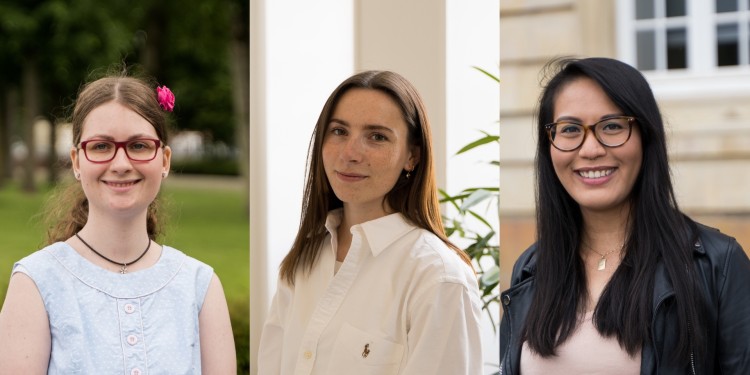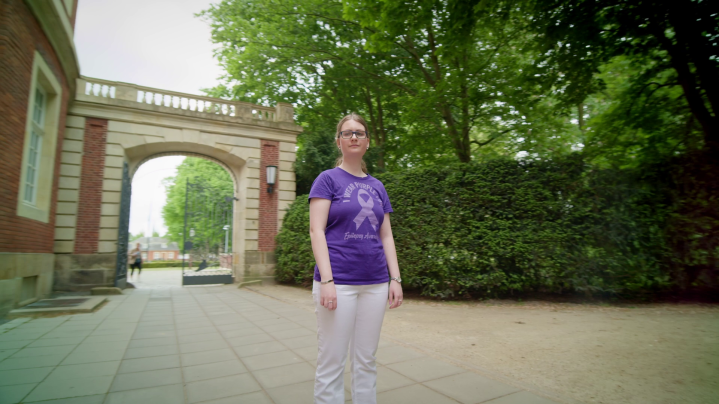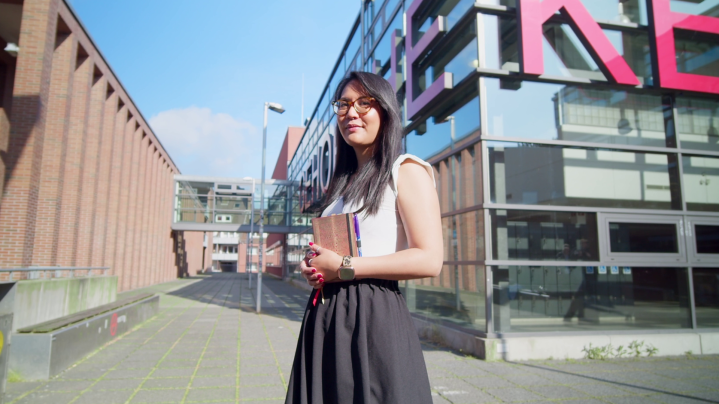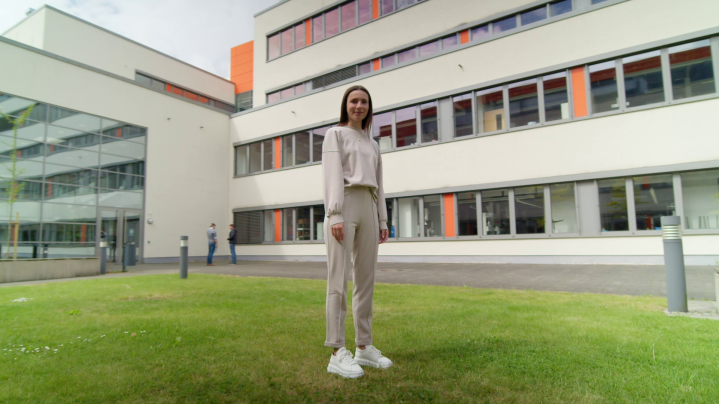
I have something that you cannot see
According to the latest findings of a nationwide survey of students in Germany, 11.87 percent of those questioned at the University of Münster said they had an impairment which made studying more difficult for them. The majority of these impairments are not visible at first glance. But they can have a considerable impact on students’ studies and everyday lives. In these guest commentaries, Anna-Lena, Nadine and Charlotte tell of their experiences.
Anna-Lena, student (Latin and History):
I’ve had epilepsy for eight years now, and it’s an illness which is largely invisible. When I was younger I had been having major and minor seizures several times a day which caused me to hear strange things, made me appear to be absent or made my arms and legs twitch. Ultimately, a benign tumour had to removed from my brain. The seizures, however, continued. The illness means that I have to take medication which has significant side-effects such as headaches, dizzy spells, difficulties in concentrating and memory problems. All these constraints have an impact on my studies. Because of the strong dizzy spells, the headaches or the sore muscles I get from the seizures, there are days when I have to stay at home and miss a day at the University. Also, I often find it difficult to concentrate in courses. I also have synaesthesia: I see every sound as a colour, which makes it difficult to concentrate in conversations.
Studying Latin means you have to have a command of a complete dictionary, which is difficult for me as I forget a lot. It would help me greatly if I could stream all the lectures so that I could pause and rewind them if necessary. Being able to use a dictionary in exams would be helpful and having an examination room to myself would make a significant difference to my concentration, as even the slightest sound startles me. In spite of all these adversities, I like my studies. I love learning new things. In this semester, for example, I have attended a course on sign language and have been to a lecture on medieval diseases. I also like teaching – something I’m good at – and so I want to train to be a teacher.

Zum Abspielen des Videos wird dieses von einem Webserver der Firma Google™ LLC geladen. Dabei werden Daten an Google™ LLC übertragen.
Nadine, master’s student (training to be a teacher of English and History):
I live with circadian rhythm sleep-wake disorder (CRSWD) and idiopathic hypersomnia (IH), both of which impact my sleep and sleeping behaviour. I have a delayed sleeping rhythm: I can’t get to sleep in the evenings, and during the day I’m permanently tired. This is why I find it difficult to adapt to “normal” everyday life at the University. IH is a rare chronic illness which causes you to have a greater need for sleep and to be excessively sleepy during the day. I can sleep for longer than eleven hours and still uncontrollably fall asleep during the day. There is medication containing stimulants which combats the illness, but I only take it when it’s really necessary because the long-term effects are still unclear.
The sleep attacks also have an adverse effect on my studies. If I have to sit still for a longer period of time, I can fall asleep. Due to my greater need for sleep and my difficulties in concentrating, I need more time for everything, especially for written exams. For this reason, I prefer oral exams – which are not, unfortunately, always on offer. In my master’s course I have a backlog of written exams which I am currently working on with help from the University’s Reading and Writing Centre.
Mental stress and (negative) reactions from outsiders are always present. No one can free themselves from prejudices, but I would like to see more tolerance and empathy among people. Despite phases when I find it more difficult, I try to have a positive attitude and actively take the time for things which give me pleasure.

Zum Abspielen des Videos wird dieses von einem Webserver der Firma Google™ LLC geladen. Dabei werden Daten an Google™ LLC übertragen.
Charlotte, student (Pharmacy):
I was born with Grade III microtia and have been deaf in my right ear since birth. Microtia is a form of auricular dysplasia – a malformation of the outer ear which often goes hand in hand with auditory canal atresia. In this case, the auditory canal is closed up or even absent. Naturally, the fact that I’m hard of hearing entails constraints in my studies and my everyday life – constraints which are often more strenuous than I would like to admit. Being among a lot of people can be a challenge – because whenever there are a lot of people together, it gets loud. Whether in the lecture hall, the lab or the refectory – everyday life at the University demands a lot of concentration on my part. Concentration to decide what is important in what is being said, what is being addressed to me, and what background noise I can ignore. Fortunately, I seldom find myself in unpleasant situations which are the result solely of being hard of hearing – but I do sometimes have to explain myself. The best-case scenario is when I sit in the first row and other people come and sit on my left side.
What I wish for students who have impairments is that they have the courage to talk about these things in their studies – whether with fellow-students, teaching staff or the inclusion tutors at Münster. I support the latter myself and I’m always very glad to be able to lend at least one sympathetic ear when any students with impairments come to see me.
For anyone interested or affected, Charlotte provides information on living with microtia on her Instagram account @lifewithmicrotia.

Zum Abspielen des Videos wird dieses von einem Webserver der Firma Google™ LLC geladen. Dabei werden Daten an Google™ LLC übertragen.
Help provided by Münster University:
There is a wide range of help and support provided by the University for students with impairments.
- The Student Advice and Counselling Centre (ZSB) offers advice on all issues relating to plans to embark on a degree course and on how to manage everyday life as a student. At the same time, it provides help in connection with further steps which make barrier-free studies possible, for example in applying for compensation for being disadvantaged.
- There have been inclusion tutors at Münster from among the student body since 2019. They put into practice their own projects relating to studying with impairments and to matters of inclusion, and they provide advice for fellow-students with impairments.
- The “Studying with an Impairment” Coordination Office provides advice and support for students and teaching staff on matters such as technical aids, barrier-free buildings or barrier-free teaching and learning materials. This is also where the project was started involving students as inclusion tutors.
- There is an independent department at the General Students’ Committee (AStA) which looks after students with disabilities or chronic illnesses, representing the interests of anyone who is disadvantaged in their studies as a result of physical and mental impairments.
All Information and further offers and websites can be found online.
This article first appeared in the University newspaper "wissen|leben”, No. 4., 1 June 2022.
